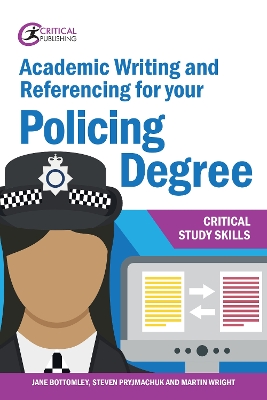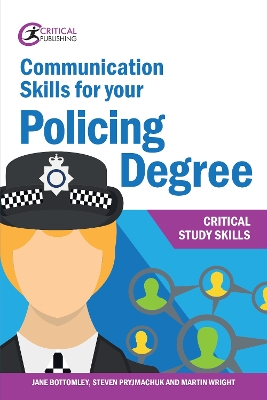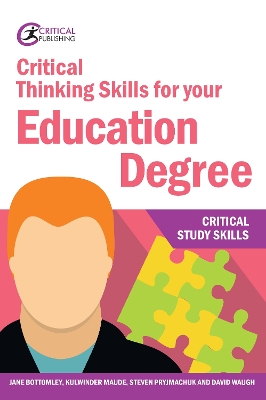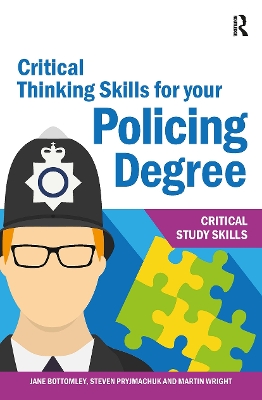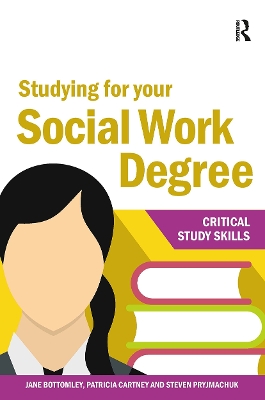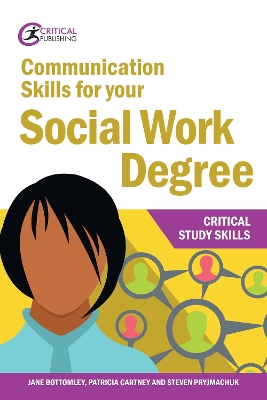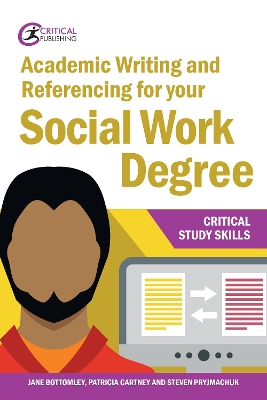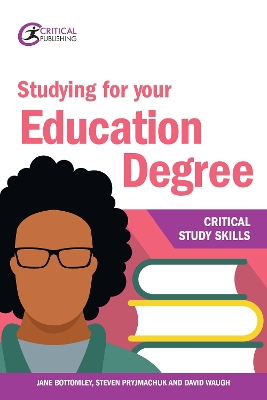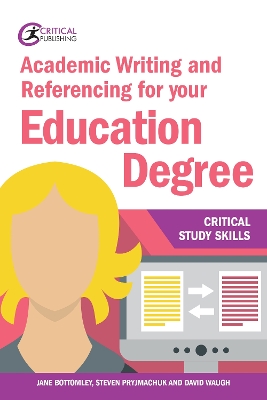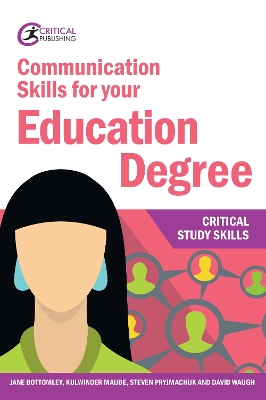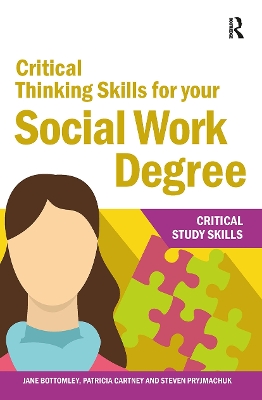Critical Study Skills
11 total works
Academic Writing and Referencing for your Policing Degree
by Jane Bottomley, Steven Pryjmachuk, and Martin Wright
If you are embarking on a university criminology, policing or other law enforcement professional degree, the books in this series will help you acquire and develop the knowledge, skills and strategies you need to achieve your goals. They provide support in all areas important for university study, including institutional and disciplinary policy and practice, self-management, and research and communication. Tasks and activities are designed to foster aspects of learning which are valued in higher education, including learner autonomy and critical thinking, and to guide you towards reflective practice in your study and work life.
Academic Writing and Referencing for your Policing Degree provides you with a sound knowledge and understanding of:
- what constitutes good academic writing in policing
- a range of strategies for writing successful essays and reports
- the importance of clarity and coherence in your writing about policing
- how to improve your academic style, grammar and punctuation, and formatting and presentation
- referencing conventions in the field of policing, and of how to avoid plagiarism.
Communication Skills for your Policing Degree
by Jane Bottomley, Martin Wright, and Steven Pryjmachuk
If you are embarking on a university criminology, policing or other law enforcement professional degree, the books in this series will help you acquire and develop the knowledge, skills and strategies you need to achieve your goals. They provide support in all areas important for university study, including institutional and disciplinary policy and practice, self-management, and research and communication. Tasks and activities are designed to foster aspects of learning which are valued in higher education, including learner autonomy and critical thinking, and to guide you towards reflective practice in your study and work life.
Communication Skills for your Policing Degree provides you with a sound knowledge and understanding of:
- how to improve your oral and written communication skills in a range of academic and professional settings
- a range of strategies for improving your public speaking, including academic presentations
- a range of techniques for improving your practical writing and speaking skills.
Critical Thinking Skills for your Education Degree
by Jane Bottomley, Kulwinder Maude, Steven Pryjmachuk, and David Waugh
Critical Thinking Skills for your Education Degree provides you with a sound knowledge and understanding of:
- the nature of critical thinking, and its relevance and importance in HE
- how to adopt a critical approach to all aspects of your studies within education
- the importance of active, critical reading, and how it allows you an efficient, principled, effective assessment of the literature in your field
- the need to adopt a critical approach to writing, characterised by analytical and evaluative use of sources and the development of your own ‘voice’
If you are embarking on a university education or teaching degree, the books in this series will help you acquire and develop the knowledge, skills and strategies you need to achieve your goals. They provide support in all areas important for university study, including institutional and disciplinary policy and practice, self-management, and research and communication. Tasks and activities are designed to foster aspects of learning which are valued in higher education, including learner autonomy and critical thinking, and to guide you towards reflective practice in your study and work life.
Critical Thinking Skills for your Policing Degree
by Jane Bottomley, Martin Wright, and Steven Pryjmachuk
If you are embarking on a university criminology, policing or other law enforcement professional degree, the books in this series will help you acquire and develop the knowledge, skills and strategies you need to achieve your goals. They provide support in all areas important for university study, including institutional and disciplinary policy and practice, self-management, and research and communication. Tasks and activities are designed to foster aspects of learning which are valued in higher education, including learner autonomy and critical thinking, and to guide you towards reflective practice in your study and work life.
Critical Thinking Skills for your Policing Degree provides you with a sound knowledge and understanding of:
- the nature of critical thinking, and of its relevance and importance in HE
- how to adopt a critical approach to all aspects of your policing studies
- the importance of active, critical reading, and how it allows you an efficient, principled, effective assessment of the literature in your field
- the need to adopt a critical approach to writing, characterised by analytical and evaluative use of sources and the development of your own ‘voice’.
Studying for your Social Work Degree
by Jane Bottomley, Patricia Cartney, and Steven Pryjmachuk
Studying for your Social Work Degree is PERFECT for anyone wanting to train to become a social worker. After reading this fully comprehensive guide you will understand:
- the structure and culture of HE, and how social work fits into it
- what to expect, and what will be expected of you, as a university student
- teaching and assessment methods within social work, so that you can perform to the best of your ability in an academic environment
- how to manage your social work studies in an effective way and make the most of the resources available to you.
The books in our Critical Study Skills series will help you gain the knowledge, skills and strategies you need to achieve your goals. They provide support in all areas important for university study, including institutional and disciplinary policy and practice, self-management, and research and communication. Packed with tasks and activities to help you improve your learning, including learner autonomy and critical thinking, and to guide you towards reflective practice in your study and work life. Uniquely, this book is written by an experienced social work lecturer and an English for Academic Purposes (EAP) lecturer.
Communication Skills for your Social Work Degree
by Jane Bottomley, Patricia Cartney, and Steven Pryjmachuk
Communication Skills for your Social Work Degree will help you to:
- improve your oral and written communication skills in a range of academic and professional settings
- improve your public speaking, including academic presentations
- improve your practical writing and speaking skills
If you are embarking on a university social work degree, the books in this series will help you acquire and develop the knowledge, skills and strategies you need to achieve your goals. Tasks and activities are designed to foster aspects of learning which are valued in higher education, including learner autonomy and critical thinking, and to guide you towards reflective practice in your study and work life.
Academic Writing and Referencing for your Social Work Degree
by Jane Bottomley, Steven Pryjmachuk, and Patricia Cartney
If you are embarking on a university social work degree the books in this series will help you acquire and develop the knowledge, skills and strategies you need to achieve your goals. They provide support in all areas important for university study, including institutional and disciplinary policy and practice, self-management, and research and communication. Tasks and activities are designed to foster aspects of learning which are valued in higher education, including learner autonomy and critical thinking, and to guide you towards reflective practice in your study and work life.
Academic Writing and Referencing for your Social Work Degree provides you with a sound knowledge and understanding of:
what constitutes good academic writing in social worka range of strategies for writing successful essays and reportsthe importance of clarity and coherence in your writing about educationhow to improve your academic style, grammar and punctuation, and formatting and presentationreferencing conventions in the field of social work, and of how to avoid plagiarism.
Studying for your Education Degree is PERFECT for anyone wanting to train to become a primary or secondary teacher or undertake an education studies course. After reading this fully comprehensive guide you will understand:
the structure and culture of HE, and how education/teaching fits into itwhat to expect, and what will be expected of you, as a university studentteaching and assessment methods within education, so that you can perform to the best of your ability in an academic environmenthow to manage your teaching/education studies in an effective way and make the most of the resources available to you.The books in our Critical Study Skills series will help you gain the knowledge, skills and strategies you need to achieve your goals. They provide support in all areas important for university study, including institutional and disciplinary policy and practice, self-management, and research and communication. Packed with tasks and activities to help you improve your learning, including learner autonomy and critical thinking, and to guide you towards reflective practice in your study and work life. Uniquely, this book is written by an experienced education lecturer and an English for Academic Purposes (EAP) lecturer.
Academic Writing and Referencing for your Education Degree
by Jane Bottomley, Steven Pryjmachuk, and David Waugh
If you are embarking on a university-based education degree, including initial teacher training, the books in this series will help you acquire and develop the knowledge, skills and strategies you need to achieve your goals. They provide support in all areas important for university study, including institutional and disciplinary policy and practice, self-management, and research and communication. Tasks and activities are designed to foster aspects of learning which are valued in higher education, including learner autonomy and critical thinking, and to guide you towards reflective practice in your study and work life.
Academic Writing and Referencing for your Education Degree provides you with a sound knowledge and understanding of:
what constitutes good academic writing in educationa range of strategies for writing successful essays and reportsthe importance of clarity and coherence in your writing about educationhow to improve your academic style, grammar and punctuation, and formatting and presentationreferencing conventions in the field of education, and of how to avoid plagiarism.
Communication Skills for your Education Degree
by Jane Bottomley, Kulwinder Maude, Steven Pryjmachuk, and David Waugh
Communication Skills for your Education Degree will help you to:
- improve your oral and written communication skills in a range of academic and educational settings
- improve your public speaking, including academic presentations
- improve your practical writing and speaking skills
If you are embarking on a university education or teaching degree, the books in this series will help you acquire and develop the knowledge, skills and strategies you need to achieve your goals. Tasks and activities are designed to foster aspects of learning which are valued in higher education, including learner autonomy and critical thinking, and to guide you towards reflective practice in your study and work life.
Critical Thinking Skills for your Social Work Degree
by Jane Bottomley, Patricia Cartney, and Steven Pryjmachuk
Critical Thinking Skills for your Social Work Degree provides you with a sound knowledge and understanding of:
- the nature of critical thinking, and of its relevance and importance in HE
- how to adopt a critical approach to all aspects of your social work studies
- the importance of active, critical reading, and how it allows you an efficient, principled, effective assessment of the literature in your field
- the need to adopt a critical approach to writing, characterised by analytical and evaluative use of sources and the development of your own ‘voice’
If you are embarking on a university social work degree, the books in this series will help you acquire and develop the knowledge, skills and strategies you need to achieve your goals. They provide support in all areas important for university study, including institutional and disciplinary policy and practice, self-management, and research and communication. Tasks and activities are designed to foster aspects of learning which are valued in higher education, including learner autonomy and critical thinking, and to guide you towards reflective practice in your study and work life.
